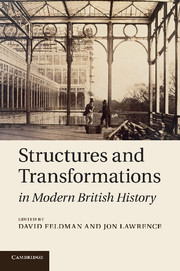Crossref Citations
This Book has been
cited by the following publications. This list is generated based on data provided by Crossref.
2012.
Making Thatcher s Britain.
p.
278.
2013.
An Everyday Life of the English Working Class.
p.
1.
Maiden, John
2015.
‘What could be more Christian than to allow the Sikhs to use it?’ Church
Redundancy and Minority Religion in Bedford, 1977–8.
Studies in Church History,
Vol. 51,
Issue. ,
p.
399.
Chapman, Alister
2015.
The International Context of Secularization in England: The End of Empire, Immigration, and the Decline of Christian National Identity, 1945–1970.
Journal of British Studies,
Vol. 54,
Issue. 1,
p.
163.
Webster, Peter
2015.
Race, Religion and National Identity in Sixties Britain: Michael Ramsey, Archbishop of Canterbury, and his Encounter with other Faiths.
Studies in Church History,
Vol. 51,
Issue. ,
p.
385.
2016.
A History of Modern Britain.
p.
101.
Kassimeris, George
and
Jackson, Leonie
2017.
Negotiating race and religion in the West Midlands: narratives of inclusion and exclusion during the 1967–69 Wolverhampton bus workers’ turban dispute.
Contemporary British History,
Vol. 31,
Issue. 3,
p.
343.
Francis, Matthew
2017.
Mrs Thatcher’s peacock blue sari: ethnic minorities, electoral politics and the Conservative Party, c. 1974–86.
Contemporary British History,
Vol. 31,
Issue. 2,
p.
274.
Hilton, Matthew
Moores, Chris
and
Sutcliffe-Braithwaite, Florence
2017.
New Timesrevisited: Britain in the 1980s.
Contemporary British History,
Vol. 31,
Issue. 2,
p.
145.
Bebber, Brett
2017.
Model migrants?: Sikh activism and race relations organisations in Britain.
Contemporary British History,
Vol. 31,
Issue. 4,
p.
568.
2018.
A Companion to Public History.
p.
483.
Saumarez Smith, Otto
2020.
Action for Cities: the Thatcher government and inner-city policy.
Urban History,
Vol. 47,
Issue. 2,
p.
274.





